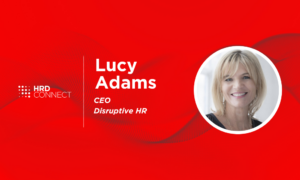The Evolution of Talent Management
- 5 Min Read
Where were we then, where are we now, and where will we be in the future? Geoffroy de Lestrange takes a look at the evolution of talent management through the years.
- Author: Geoffroy de Lestrange
- Date published: Oct 17, 2019
- Categories

Having a talent in the world of Britain’s Got Talent you must be a gifted singer, or magician, or dog act, or something else that entertains the crowd. However, being a talent in the world of work is much more straightforward– you must “simply” have a natural aptitude and / or a technical skill that contributes to the success of your employer. And everyone has something they’re good at, but whether that aptitude is spotted and harnessed is another challenge altogether.
Talent management was a term coined in 1997 and featured predominately in a report by McKinsey. From that moment, it gained traction as humans were, and continue to be, seen as an organisation’s most valuable asset.
It’s actually a term that has never had a rigid definition, and that’s great because it’s given it room to evolve as organisations themselves evolve. What talent management was 20 years ago isn’t what talent management is today. Whilst the global meaning of the term – a strategy to help organisations make the most of their people – has always been broadly the same, the focus and impact on employees and the business has changed.
What it was
Talent management used to focus on the most talented employees in the organisation and many firms used grid systems to identify high performers. One of the most popular grids is the 9-box which accesses employees based on potential and performance, with the highest performance and potential sitting in the top right and the lowest performers and potential sitting in the bottom left. The main issue with this 9-box system is that more focus is placed on retaining the high performers and maximising those with high potential. Where does that leave the others whose potential is not recognised yet? Unfortunately, this traditional definition is still commonly used across Europe, as various studies supported by Cornerstone have shown.
Also, the discussions and ‘metrics’ for these positions on the grid could easily lead to different values being placed on skillsets and varying views on the performance of the individual. The majority of the input comes from managers feedback which could be skewed depending on relationships. We’ve all read the studies that indicate that managers consciously or unconsciously favour people like themselves. Likewise, we know and have seen proof that a diverse workforce is key to the organisation’s success.
What it became
Talent management became the management of the entire workforce and not just high performers and high potentials. To scale, in came an influx of talent management technology which aimed to give HR teams a way to streamline processes and gain insight into their workforce globally. Many of these platforms included self-service functionality, which allowed employees to access and update information, taking the admin burden away from HR.
The HR team felt empowered with better visibility of their workforce, giving them the ability to plan for the future and align talent objectives with business objectives. However, whilst employees could gain access to these platforms, the functionality for them was limited. It had been designed for the HR team first, after all.
What it is today
The technology of today brings together talent management – answering the needs of the business – and talent experience – answering the needs of the employees. If a platform doesn’t do both, it cannot serve its purpose in today’s world of work.
The HR team is given everything it needs through a process-oriented approach, whilst employees are offered a great experience through a platform which is journey-oriented. And answering the needs of employees isn’t just a case of keeping them on side, with a better platform for them, the HR team benefits from higher engagement levels as employees look to take charge of their careers.
Artificial intelligence (AI) and gamification approaches have also helped evolve talent management platforms into high performing systems which are key to attracting, retaining, developing and rewarding people. The boundaries between internal and external employees have blurred and expanded an organisation’s talent pool.
Moreover, well optimised automation technology alongside human input helps surface employees and candidates with untapped potential, giving them a means to thrive in the organisation. It’s that push and support organisations need towards a more diverse workforce.
So, what’s next for talent management?
Workforce data is becoming more and more comprehensive and standardised which helps organisations understand talent trends and act upon them. It also allows organisations to have a holistic view of their people – from hire to retire. There’s more work to be done to make AI more intelligent with a better application of human intelligence, but with this increase in data and automation technology, organisations can also better personalise talent management at scale.
We must not forget that people work with people and the evaluation and maximisation of team performance is increasing in importance.
It’s clear that talent management will continue to evolve as technology enhances various aspects. The core definition will remain true in that talent management maximises organisations ‘biggest asset’. Your employees may not be right for the stages of Britain’s Got talent, but every individual has something to offer and it’s up to organisations to unlock the power of this potential.
By Geoffroy de Lestrange, Cornerstone OnDemand.








